This disease is a chronic, inflammatory and recurrent process that mainly affects the scalp area.
It is a generally accepted fact that scalp psoriasis is only the initial stage in the development of psoriasis, which leads to the development of more severe forms throughout the body.
Characteristics of the manifestations and course of the disease
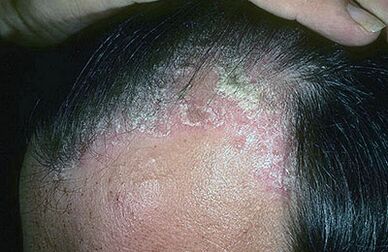
A disease such as psoriasis of the scalp is manifested by the appearance of a dense "cap" in the scalp, which is followed by severe itching and peeling.
There is another version of the manifestations where a single small plaque is formed.
The symptoms of psoriasis are different from seborrheic dermatitis, the complete absence of damage to the structure of the hair roots.
With psoriasis of the scalp, hair loss has no symptoms at all.
The scales that form in psoriasis contain a large amount of sebum, so they can be easily identified by touch, which is not the case with exfoliation during seborrheic dermatitis.
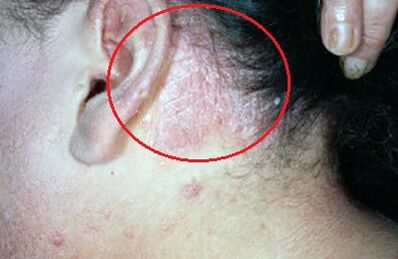
The most vulnerable areas of the head in psoriasis are:
- Area around the ear, earlobe.
- Separation area.
- Frontal, occipital and cervical region.
Scalp psoriasis is common, characterized by frequent relapses and is chronic.
This dermatological disease is always chronic because it is impossible to fully recover.
Psoriasis of the scalp is the most common.
Causes of the disease
The main cause of this condition is hereditary predisposition.
If a person's close relatives have this disease, the probability of hereditary transmission is at least 70%.

Secondary causes of psoriasis include:
- Hormonal imbalance.
- Decreased levels of the body's defenses.
- Diseases of the liver and bile ducts.
- Alcohol abuse and smoking.
- Constant stress, lack of sleep.
- Malnutrition.
But these are far from all the reasons why this disease can occur.
Some reasons are too rare, so try not to mention them.
This disease is most commonly reported in people aged 40-42 or older. If you suffer from people under the age of 20, it is usually associated with a weakened immune system or hormonal disorders. Therefore, after prescribing a vitamin regimen and restructuring a person who focuses on an active healthy lifestyle, the irritation disappears.
It is noticeable that after each well-planned treatment, the skin gradually clears, no scars remain, and inflammatory papules do not return.
The main symptoms
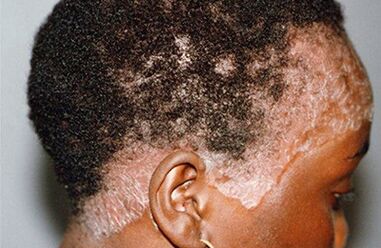
Scalp psoriasis develops in any of the areas described above, always accompanied by the appearance of single or multiple foci of inflammation, supplemented by the appearance of characteristic dense scales, and accompanied by severe itching.
There are almost no pronounced symptoms in the primary stage of the disease, and patients are often unaware that they are being caught up in dermatological pathology. The patient has no complaints, external examination shows no specific symptoms.
In addition, some patients note that the initial stage is very similar to dandruff, so long shampoo treatments are possible to eliminate the faulty pathology.
If the process is neglected, it can spread deep into the skin, affect the root system of the hair and cause hair loss.
A disease such as scalp psoriasis has its own stages, which include:
- Stage of progression. New symptoms of inflammation appear. This process takes place from the center to the periphery.
- Standing stage. It is characterized by relative calm, during which the formation of new inflammatory elements ceases, but the existing symptoms do not disappear.
- Regression phase. At this stage, the main symptoms of psoriasis are relieved. Typical psoriatic outbreaks are replaced by pigmentation foci.
Characteristics of treatment
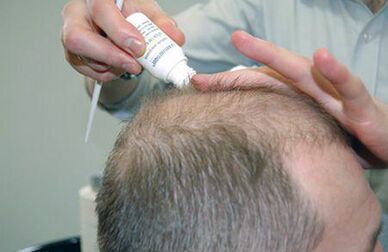
Processes such as the treatment of scalp psoriasis should be considered as a whole complex of measures. This package of measures can be broadly divided into:
- General therapy.
- Local therapy.
- Physiotherapy treatment.
- Spa treatment.
- Traditional methods.
General or drug therapy involves the identification of the following groups of drugs that can effectively treat psoriasis:
- Sedatives.
- Multivitamin tablets.
- Hyposensitizing drugs.
- Cytostatic drugs.
- Corticosteroid drugs.
- Antihistamines.
- Immunomodulatory agents.
- Non-specific drug therapy (ATP) drugs.
It is important to note that the use of cytostatic drugs and corticosteroids is only possible in severe disease. They should be used with extreme caution, as they may cause significant worsening of the disease.
Antibacterial drugs should only be used if they are associated with a pathogenic microflora.
Topical therapy for psoriasis of the scalp involves the use of:
- Keratoplastic ointments: ichthyol ointment, naphthalene ointment, salicylic ointment, sulfur tar ointment.
- Glucocorticoid ointments. Such an ointment is used only in severe cases of the course of the disease.
- Folk remedies for local use.
Shampoos are used as another effective treatment. The only caveat is that this tool will only be effective in combination with other methods.
The following have been shown to be effective treatments for psoriasis of the scalp:
- Tar shampoo.
- Zinc shampoo.
- Shampoo containing ketoconazole.
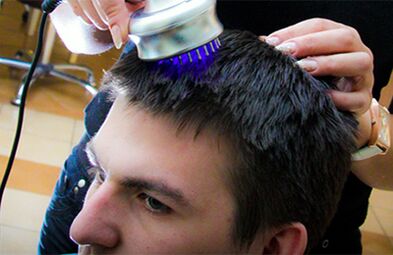
Physiotherapy is another effective topical treatment for psoriasis.
The following physiotherapeutic agents are used to treat psoriasis of the head:
- UV radiation from the skin.
- Hydrotherapy.
- Plasmapheresis method.
- Hemisorption.
- Laser radiation.
- Mud wraps and applications.
- Sunlight treatment.
- Bathing in hydrogen sulfide boiling and spa.
Typical techniques are stress and psychological stress relief. To do this, the patient is prescribed sedatives to relieve high levels of nervous irritability. Saturating a patient’s body with vitamins is one of the most important details of treatment.
When determining the most appropriate diet for a patient, attention should always be paid to the compatibility of the food and medication, as well as to the supply of the food itself. This important detail helps to reduce the load on the patient's gastrointestinal tract as well as other internal organ systems.
Folk remedies are used as additional methods.
Methods of traditional medicine

Can Scalp Psoriasis Be Cured By Traditional Methods? This question cannot be answered unambiguously.
We can only say that, as an independent method of treatment, folk methods are ineffective, only as a supplement to the main one. Consider in detail the most effective alternative methods for treating scalp psoriasis.
Method 1. The celandine juice must be prepared by first passing the celandine herb through a mincer and then squeezing it out. This product can be supplemented by adding 40 ml of dry red wine and then applied as creams to the affected areas of the scalp.
Method 2. You can also use the alcoholic tincture of the herb celandine to lubricate the scalp. To prepare half a glass of dry herb should be poured 0, 5 liters of 70% medical alcohol (you can also use vodka).
This treatment should be adhered to for 7 days and then used to wipe the affected areas. In addition, after applying the tincture, rinse your hair with a strong infusion of chamomile.

Method Number 3. You can use "Monastery Tea" as an excellent tool for the general detoxification of the body, which cleanses the body of toxins, cleanses the liver and helps to get rid of all manifestations of psoriasis. During treatment, this tea can be consumed instead of the usual black or green tea.
Method 4. The skin manifestations of psoriasis of the scalp can be treated by folk methods using the fruits and stems of rosehip.
To do this, the stems and fruits must be burned to an ash condition and then rubbed into the affected areas. For better absorption, pharmacy petroleum jelly can be added to the ash.
From folk remedies, it is recommended to remove traces of oil on the skin and hair with a vinegar solution. It is usually made in a 50x50 part ratio. There are many treatment options, but it is always important to choose the right one. To do this, seek the advice of the best experts.
Prophylaxis
To prevent recurrence of psoriasis of the scalp, you should follow these rules:
- Follow personal hygiene rules and take good care of your hair and scalp.
- Avoid alcohol and smoking.
- Limit stressful situations as much as possible.
- Pay attention to the way you work and rest.
- Follow a special diet.
- Take multivitamin preparations every six months.
- Hair should only be dyed with hypoallergenic dye or not dyed at all.
- Treat all existing illnesses in a timely manner.
- Folk methods should be used to strengthen the body in general.
From all of the above, it can be concluded that psoriasis of the scalp is not an independent disease but another manifestation of such a serious disease.
In terms of financial costs, the treatment described can be called a budget, while the "the more expensive the better" stereotype is unacceptable. There is nothing more valuable in the world than the health of your own and loved ones. And remember, it is better to prevent the disease than to cure it later.
To be healthy!























